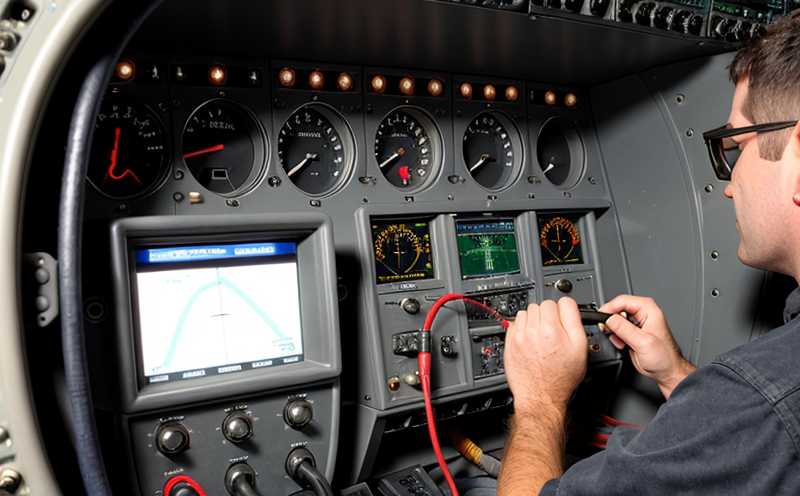ISO 1564 Conducted Immunity Testing
The ISO 1564 standard provides a framework for assessing conducted immunity in electrical and electronic systems, ensuring their robustness against electromagnetic interference (EMI). This testing is crucial for aerospace and aviation avionics as it helps prevent failures due to external EMI sources. Conducted Immunity Testing evaluates an aircraft’s ability to function correctly when exposed to conducted emissions within its operational frequency range.
In the aerospace sector, avionics systems are highly sensitive to electromagnetic interference. The ISO 1564 standard ensures that these systems can operate reliably in a hostile environment without malfunctioning or causing hazards. This testing is particularly important for ensuring compliance with aviation regulations and standards such as FAR Part 23 (Federal Aviation Regulations) and JAR-23 (Joint Aviation Requirements).
The conducted immunity test involves subjecting the avionics system to specific frequency bands, typically ranging from 80 kHz to 1 GHz. The specimen is connected to a power supply and subjected to controlled conducted emissions. The test aims to determine if the system can function correctly under these conditions without any degradation in performance or data corruption.
The testing process begins with thorough preparation of the avionics system, ensuring it is representative of the actual equipment used on aircraft. Once prepared, the specimen is connected to a power supply and placed into the test chamber. The test chamber is designed to simulate real-world electromagnetic environments, including conducted emissions from other electronic devices.
The testing apparatus includes a wide range of components such as power supplies, attenuators, and filters to ensure accurate measurement of conducted emissions. The test setup allows for precise control over the frequency and amplitude of the conducted emissions, enabling detailed analysis of the system’s response under various conditions.
After conducting the tests, the results are analyzed to determine compliance with the ISO 1564 standard. Compliance is assessed based on predefined acceptance criteria, which specify the maximum allowed conducted emissions that a system can withstand without malfunctioning. If the system passes the test, it indicates that it can operate reliably in the presence of external conducted emissions.
The importance of this testing cannot be overstated, especially in the context of aviation safety. Non-compliance with ISO 1564 could lead to malfunctions or failures during critical phases of flight, potentially resulting in accidents. Ensuring compliance helps maintain a safe and reliable avionics ecosystem within aircraft.
The results of the conducted immunity tests are reported comprehensively, detailing the test setup, parameters, and system response under different conducted emission conditions. This report serves as valuable documentation for quality assurance and regulatory compliance purposes.
Applied Standards
- ISO 1564: Conducted Immunity Testing
- JAR-23 (Joint Aviation Requirements)
- FAR Part 23 (Federal Aviation Regulations)
Eurolab Advantages
EuroLab offers state-of-the-art facilities for ISO 1564 conducted immunity testing, providing a comprehensive solution to meet the stringent requirements of aerospace and aviation avionics systems. Our experienced team ensures that all tests are conducted in accordance with international standards, guaranteeing accurate and reliable results.
Our laboratory is equipped with advanced test chambers designed to simulate real-world electromagnetic environments, allowing for precise testing under controlled conditions. This setup enables us to conduct thorough and detailed tests, ensuring the robustness of avionics systems against conducted emissions.
We offer a wide range of services beyond ISO 1564 testing, including EMC (Electromagnetic Compatibility) testing, environmental testing, and certification services. Our multi-disciplinary team ensures that our clients receive comprehensive support throughout their testing needs.
Our commitment to quality is reflected in the certifications we hold, which include ISO/IEC 17025 for laboratory competence. This certification ensures that our testing processes meet the highest standards of accuracy and reliability. Our experienced staff also includes certified test engineers who are experts in avionics systems and conducted immunity testing.
At EuroLab, we pride ourselves on providing not only reliable results but also valuable insights into the performance of your avionics system under various electromagnetic conditions. Our goal is to help you achieve compliance with aviation regulations while enhancing the reliability and safety of your products.
Competitive Advantage and Market Impact
EuroLab's advanced facilities and experienced team provide a significant competitive advantage in the aerospace industry. By ensuring that avionics systems meet stringent conducted immunity testing standards, we help our clients achieve compliance with aviation regulations while enhancing product reliability and safety.
- Compliance with ISO 1564 ensures robustness against electromagnetic interference.
- Precise testing in controlled environments leads to more reliable avionics systems.
- Enhanced product safety reduces the risk of malfunctions during critical flight phases.





